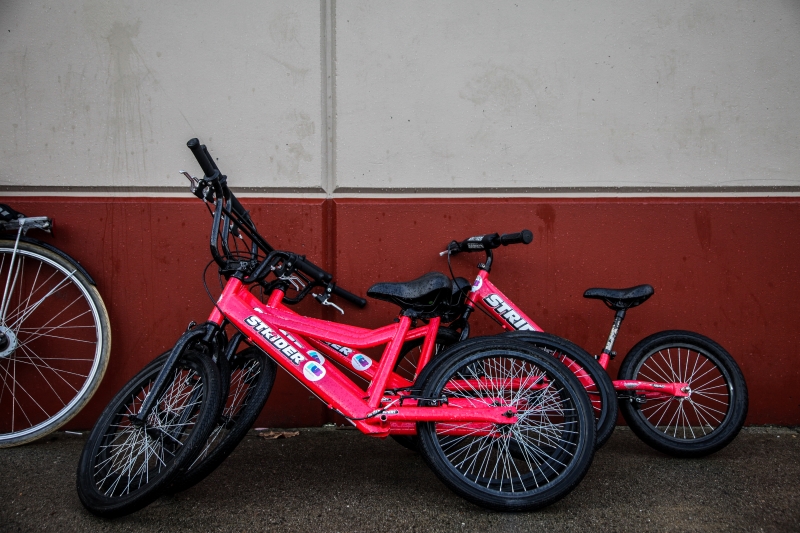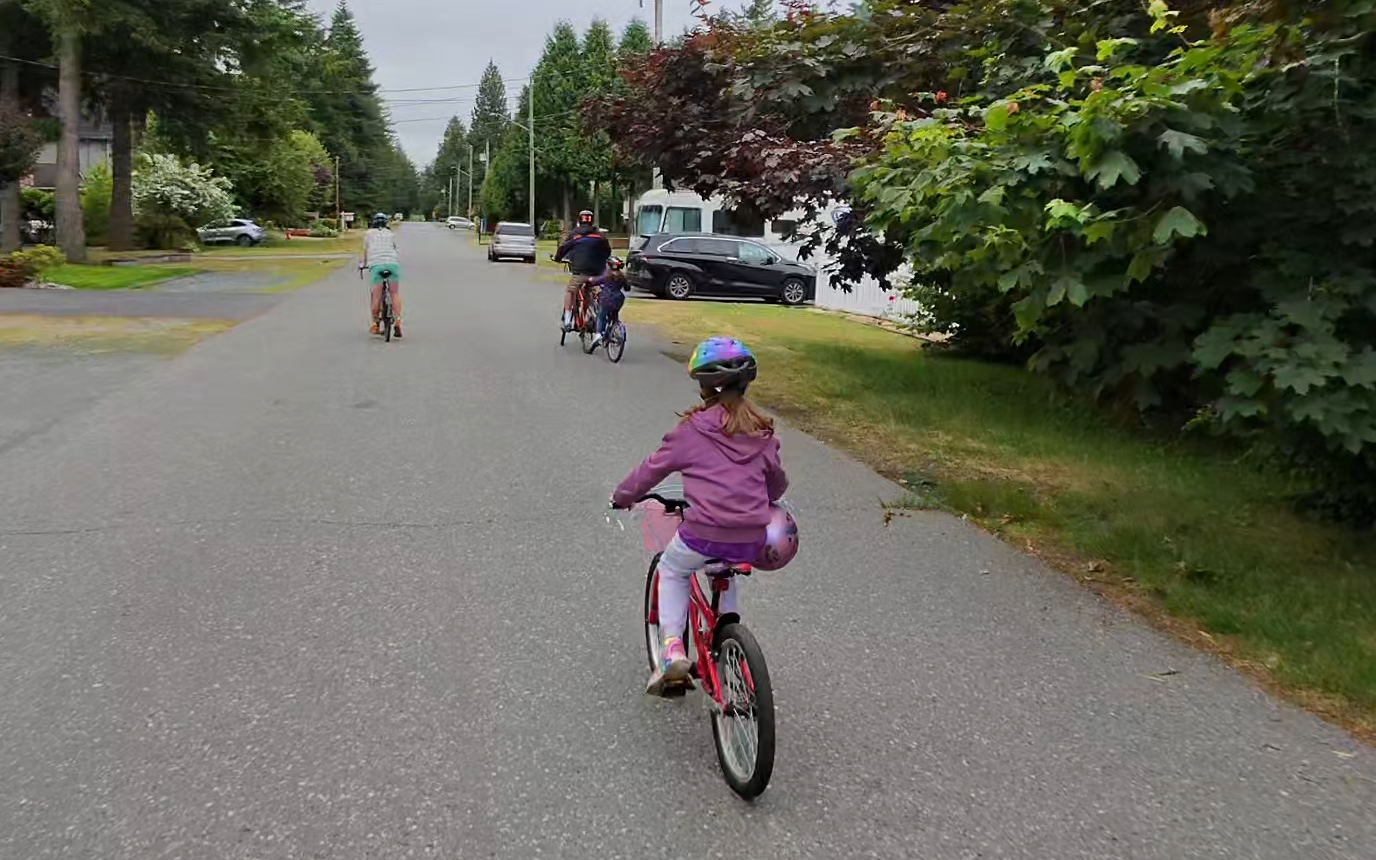Table of Contents
Every Friday morning at 8 a.m., a small but growing group of children and parents gather at the corner of 204th Street and 41A Avenue in Langley.
Armed with bikes, helmets, and bright smiles, they're part of the Belmont Bike Bus—a weekly group ride that's helping kids get to school under their own power while building community connections.
The movement, which started with just one family and a few neighbors, represents a simple solution to several problems facing families in Langley and across the Lower Mainland: traffic congestion around schools, children's fitness levels, and the challenge of creating safe spaces for kids to be independent.
As gas prices remain high and more families struggle with the costs of daily driving, the bike bus offers an alternative that saves money while promoting health.
For families in Langley, where suburban sprawl often means relying on cars for every trip, the bike bus demonstrates that alternatives exist—even in communities not traditionally seen as bike-friendly.
With wide shoulders on many roads and good tree cover providing shade, Langley's Brookswood neighborhood turns out to be surprisingly well-suited for family cycling.
From Truck Driver to Bike Bus Leader
Nathan Tiessen never expected to become a cycling advocate.
The self-described "hardcore car guy" had just bought a brand new Toyota Hilux diesel truck when his family moved to Adelaide, Australia, for his wife's work. But the Langley resident's two-year stint down under changed everything.
"Anyone who owns a diesel truck knows that short cycling the motor is a great way to kill it, and we found that most things we needed to go to were within about 2 km," Tiessen explained. "So we bought a couple e-bikes to get around for the short trips."
What started as a practical decision to save his truck became a lifestyle transformation.
Soon, Tiessen was hauling his kids in a bike trailer for trips up to 10 kilometers, and by the end of their Australian adventure, they were logging 50-kilometer days. His expensive truck sat gathering spiderwebs while he discovered something unexpected.
"I realized I was happier, stronger, was saving a pile of money, and was sleeping a lot better," he said.
Before getting on a bike, Tiessen weighed 260 pounds and spent his days sitting in traffic. The daily rides changed not just his commute, but his entire approach to health and transportation.
When the family returned to Brookswood, Tiessen saw his neighborhood with fresh eyes. The tree-lined streets, wide shoulders, and relatively flat terrain made it just as bikeable as Adelaide—maybe even better.
Inspired by Coach Balto, a PE teacher in Portland, Oregon, who created one of the first bike buses after realizing his limited gym classes weren't enough to keep kids fit long-term, Tiessen decided to bring the concept to Langley.
How the Bike Bus Works
The Belmont Bike Bus follows a carefully planned route through quiet residential streets and multi-use paths, avoiding busy roads whenever possible. The structure is simple but effective, borrowed from the original Portland model.
Three adult volunteers take specific roles to keep kids safe.
Carol, the captain, leads from the front and calls out instructions at intersections. Eric, the sprinter, rides in the middle of the pack and darts ahead to block intersections when needed. Tiessen serves as the sweeper, riding at the back to ensure no child gets left behind and carrying tools for quick repairs.
"Our helmets have a total of about 400 synchronized rear-facing LEDs that double as brake and turn lights," Tiessen noted, adding that his favorite piece of equipment is a helmet with a built-in LED sign reading "BIKE BUS - 1.0M TO PASS SAFELY."
The pace is kept at a comfortable 11 kilometers per hour—slow enough for the kids to chat while riding but fast enough to get to school on time.
Children as young as four participate, and those who can't make the whole journey can catch a ride on Tiessen's cargo bike for part of the way.
Also, weather doesn't stop the bike bus. During February's cold snap, when temperatures dropped to minus 11 degrees, the group still rode.
"The kids were warmed up enough by the time they got to school from riding that I think they were warmer than the kids who were dropped off in cars," Tiessen said.
Breaking the Car Dependency Cycle
One of the biggest challenges facing the bike bus isn't rain or cold—it's changing ingrained habits. Tiessen describes it as breaking a "feedback loop" that keeps kids car-dependent.
"Parents don't feel like it's safe for their kids to walk or bike to school, so they drive them, so there are more cars around the school, so parents don't feel like it's safe for their kids to walk or bike to school," he explained. "I'd like to help break that loop."
The irony isn't lost on anyone: the very act of driving kids to school for safety creates the unsafe conditions parents fear.
During drop-off and pick-up times, schools across the Lower Mainland become clogged with idling vehicles, creating air pollution and hazards for the few children who do walk or bike.
Occasionally, the bike bus encounters parents parked in bike lanes, forcing the group to navigate around them. But Tiessen takes a diplomatic approach, chatting with drivers and pointing out legal parking spots while mentioning that bylaw officers ticket bike lane violations weekly.
"Most drivers tend to be pretty respectful when they see a group of kids riding to school," he said. The visibility of the bike bus—with its LED lights and group presence—actually makes riding safer than going solo.
Growing Movement Across the Region
The Belmont Bike Bus isn't alone. Across the Lower Mainland, similar programs are sprouting up as families seek alternatives to driving.
HUB Cycling, a regional cycling advocacy organization, now runs bike buses at several schools with trained instructors leading the rides.
The HUB program operates at Florence Nightingale Elementary and Lord Tennyson Elementary in Vancouver, Campus View Elementary in Saanich, Ocean Cliff Elementary in Surrey, and Emily Carr Elementary in Vancouver. A parent-led bike bus also runs at Gordon Elementary in Vancouver. James Kennedy Elementary has started one, and a school in Aldergrove is planning to launch soon.
The provincial government is supporting the movement through funding in partnership with the Society for Children and Youth of BC's Walking School Bus Initiative.
Five schools were selected for spring 2025, with five more to be added in the fall.
These programs share similar benefits: improved child health and fitness, stronger community connections, reduced traffic and air pollution around schools, and increased road safety through visibility. They also provide children with independence and confidence while taking concrete action on climate change.
Simple to Start, Powerful in Impact
Starting a bike bus doesn't require much—just a few interested families, a safe route, and someone willing to take the lead.
There's no insurance needed since it's simply a free group ride, and BC's recent changes removing lawyers from collision settlements have simplified liability concerns.
"If your child can ride for 15 minutes straight, they can ride on the bike bus," Tiessen said. Even younger children who can only manage five minutes can start the ride and then hop on a cargo bike for the rest of the journey.
The reaction from parents has been overwhelmingly positive, though many say their children need more confidence before joining a group ride. Bike camps can help prepare kids, and the bike bus itself builds skills through regular practice.
Both the Parent Advisory Council and Belmont's principal support the program.
The PAC shares posts on Facebook weekly, and Principal Janzen includes bike bus information and reminders about not parking in bike lanes in every newsletter.
Tiessen has invested about $1,000 in safety equipment like helmets with built-in signals and brake lights, though he uses these for all his daily riding, not just the bike bus.
The real investment is time—shooting video of each ride and creating Instagram posts to spread the word.
"I'd love to have a co-captain who is better at getting the word out in traditional media," he admitted. "I tend to hide a bit from the limelight."
A Vision for Healthier Communities
The bike bus movement represents more than just a different way to get to school.
It's about reimagining what communities can be when families have options beyond driving everywhere.
It's about giving children independence and fitness habits that will last a lifetime. And it's about proving that even car-dependent suburbs can change.
For Tiessen, seeing hundreds of kids riding to Belmont Elementary like they do in Portland remains the dream. But change happens "a little bit at a time," and every Friday morning, as a few more children join the ride, that dream gets closer to reality.
Parents interested in starting their own bike bus can find resources at bikebus.world or contact the Langley bike bus through Instagram @langleybikebus. HUB Cycling also offers support and advice for parent groups looking to organize rides.
As one bike bus leader put it: "It is not your job to solve all of society's ills. Start with a route that works for you and hopefully other people."
References and Further Reading



What did you think of this story?
Take our quick 2-minute survey to let us know how we're doing and what topics you'd like to see The Langley Union cover next.




